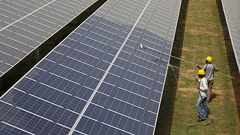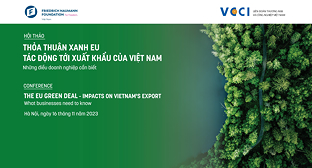India: Anti-dumping duty on solar cell component EVA can be counterproductive
05/04/2019 12:00

The government has on Monday imposed anti-dumping duty of up to $1,559 per tonne on EVA from China, Malaysia, Saudi Arabia and Thailand for five years to safeguard the interest of domestic manufacturer.
The government's move to impose anti-dumping duty on a solar cell component, Ethylene Vinyl Acetate (EVA), could be counterproductive and might lead to an increase in the overall cost of solar equipment of up to 20 per cent.
The imposition of anti-dumping duty would eventually lead to an increase of 15-20 per cent on the cost of solar equipment, Vinay Rustagi, managing director, Bridge to India, a solar consultancy firm told ETEnergyWorld.
"The anti-dumping duty on the imports of a solar cell component called EVA is the second such measure after a similar duty was imposed on module glass imports. It is hoped that the duty protection will give relief to domestic suppliers and lead to greater investment and jobs in the domestic industry," Rustagi added.
The government had on Monday imposed anti-dumping duty of up to $1,559 per tonne on EVA from China, Malaysia, Saudi Arabia and Thailand for five years to safeguard the interest of domestic manufacturer.
More than 90 per cent of the solar panels and modules used in Indian solar projects are sourced from China and Malaysia. Many industry experts believe that cheap imports from these countries cause serious injury to domestic solar manufacturers.
Considering the government's ambitious target of expanding the share of renewableenergy in the energy mix the imposition of such a duty can be counterproductive, said Sanjeev Aggarwal, founder and chief executive officer, Amplus Energy Solutions, a Gurugram-based solar power developer.
"We believe that imposing safeguard duty and trying to promote domestic manufacturing of solar modules or any part thereof is counter-productive for the economy as a whole since the global market has an excess supply of solar modules today and it will continue like that in the foreseeable future,” Aggarwal explained.
The government is working on a target to achieve 175 Gigawatt (GW) of renewable energy generation capacity by 2022. That includes 100 GW of solar, 60 GW of wind, 1 GW of biomass-based plants, and 5 GW for small hydro. The solar power capacity target includes 40 GW of rooftop solar projects.
Arun Rao, director of marketing at Magenta Power, a renewable energy service company believes the move directly impacts the solar industry in 2 ways -- The input costs of the solar module manufacturers will go up by Rs 0.75 per watt which is an increase of 4 per cent in the module cost and solar module manufacturers are afraid that the poor transparency of the EVA encapsulate would negatively impact the productivity of the solar panels.
Arindam Som, analyst at research firm India Ratings and Research, said that EVA sheets were a very small component of the total PV module in terms of cost and, therefore, it was unlikely that the duty would have any major impact on the overall cost of the equipment. "There will not be any major change in the import and domestic procurement of the solar module," he added.
Solar EVA sheet is an important component of the solar equipment as it helps in enhancing the durability and performance of solar panels.
The government's move to impose anti-dumping duty on a solar cell component, Ethylene Vinyl Acetate (EVA), could be counterproductive and might lead to an increase in the overall cost of solar equipment of up to 20 per cent.
The imposition of anti-dumping duty would eventually lead to an increase of 15-20 per cent on the cost of solar equipment, Vinay Rustagi, managing director, Bridge to India, a solar consultancy firm told ETEnergyWorld.
"The anti-dumping duty on the imports of a solar cell component called EVA is the second such measure after a similar duty was imposed on module glass imports. It is hoped that the duty protection will give relief to domestic suppliers and lead to greater investment and jobs in the domestic industry," Rustagi added.
The government had on Monday imposed anti-dumping duty of up to $1,559 per tonne on EVA from China, Malaysia, Saudi Arabia and Thailand for five years to safeguard the interest of domestic manufacturer.
More than 90 per cent of the solar panels and modules used in Indian solar projects are sourced from China and Malaysia. Many industry experts believe that cheap imports from these countries cause serious injury to domestic solar manufacturers.
Considering the government's ambitious target of expanding the share of renewableenergy in the energy mix the imposition of such a duty can be counterproductive, said Sanjeev Aggarwal, founder and chief executive officer, Amplus Energy Solutions, a Gurugram-based solar power developer.
"We believe that imposing safeguard duty and trying to promote domestic manufacturing of solar modules or any part thereof is counter-productive for the economy as a whole since the global market has an excess supply of solar modules today and it will continue like that in the foreseeable future,” Aggarwal explained.
The government is working on a target to achieve 175 Gigawatt (GW) of renewable energy generation capacity by 2022. That includes 100 GW of solar, 60 GW of wind, 1 GW of biomass-based plants, and 5 GW for small hydro. The solar power capacity target includes 40 GW of rooftop solar projects.
Arun Rao, director of marketing at Magenta Power, a renewable energy service company believes the move directly impacts the solar industry in 2 ways -- The input costs of the solar module manufacturers will go up by Rs 0.75 per watt which is an increase of 4 per cent in the module cost and solar module manufacturers are afraid that the poor transparency of the EVA encapsulate would negatively impact the productivity of the solar panels.
Arindam Som, analyst at research firm India Ratings and Research, said that EVA sheets were a very small component of the total PV module in terms of cost and, therefore, it was unlikely that the duty would have any major impact on the overall cost of the equipment. "There will not be any major change in the import and domestic procurement of the solar module," he added.
Solar EVA sheet is an important component of the solar equipment as it helps in enhancing the durability and performance of solar panels.
April 4, 2019
Source: ET Energy
Source: ET Energy
Các tin khác
- Textile and garment exports recovered positively (19/04/2024)
- Foreign steel imported en masse, manufacturers call for protection (19/04/2024)
- US targets Chinese steel with 'overcapacity' fallacy amid escalating trade tensions; move casts great uncertainty on stabilizing bilateral ties (19/04/2024)
- Thailand is considering implementing protective tariffs on imports from China (19/04/2024)
- Fruit and vegetable exports to RoK and Thailand surge (19/04/2024)
 Home
Home
 About Us
About Us




















